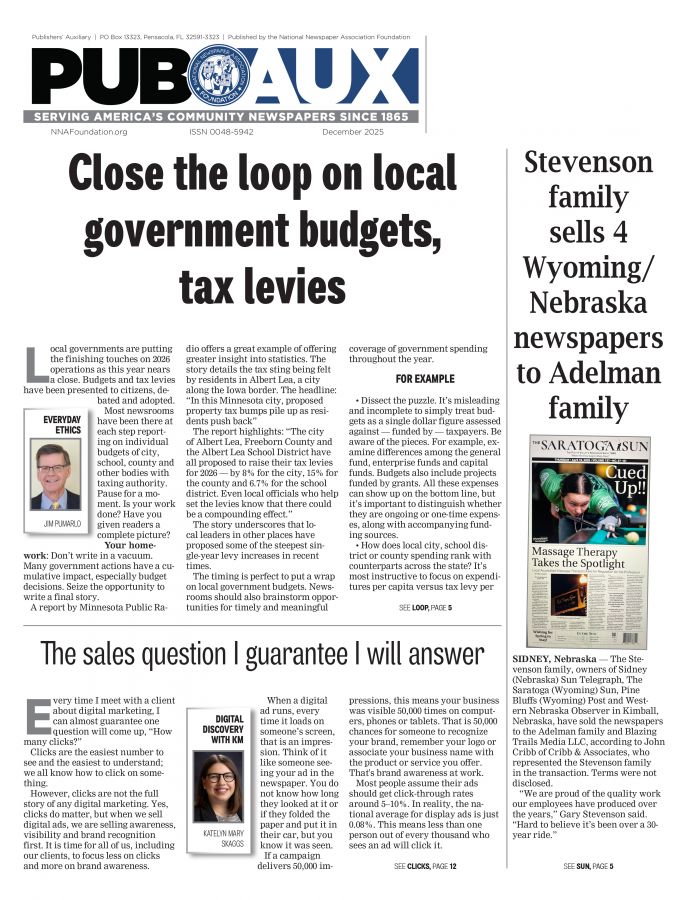Today’s journalism graduates: What professionals and educators expect
May 1, 2015
From The College of Journalism and Mass Communications
University of Nebraska-Lincoln
LINCOLN, NE—With 2015 college graduations approaching, a survey of journalism educators and professionals found accuracy, ethical principles and good news judgment were the top skills journalism graduates need for the professional workplace. Those top skills were followed by growing demand for digital, mobile and social media reporting skills.
The national survey of 665 journalism educators and professionals was conducted by the University of Nebraska-Lincoln’s College of Journalism and Mass Communications. Published in this month’s Journal of Media Education, the survey asked journalism managers, non-managers, and educators to rank skills and experiences journalism graduates need for the professional workplace.
The survey found sharp differences between respondents over the job college journalism programs do preparing graduates for journalism careers. Nevertheless, 81 percent of those surveyed said a college journalism degree would be “very helpful” or “helpful” for those wishing to get newsroom jobs.
Survey respondents from all three groups identified accuracy, ethical principles, and good news judgment as the top three “very important” skills for journalism graduates to possess. Respondents also listed digital reporting, good mobile skills, and social media reporting as either “very important” or “important” skills for journalism graduates to possess.
“News professionals and journalism educators agree that newer technology skills are increasingly important for graduating journalists,” said UNL associate professor Bernard “Barney” McCoy, who conducted the survey. “However,” McCoy said, “they ran a distant second to accuracy, ethics and good news judgment as the most important skills journalists should possess.”
“I was not surprised that the results suggest the growing importance of new technology skills,” said David Dary, former chair of the School of Journalism at the University of Oklahoma and a former CBS and NBC reporter. Dary said such skills, while important, shouldn’t push aside the need for “thinking skills” and “objectivity” needed in reporting the news.
News professionals and journalism educators did have different views on the job colleges do in preparing journalism graduates for the professional workplace. Among journalism educators, 64 percent “strongly agree” or “agree” that college journalism programs are doing a good job of preparing journalism graduates to enter the professional workplace. Only 30 percent of professional news managers and 45 percent of non-management news professionals had the same responses.
News professionals and journalism educators were asked if college journalism programs are doing a better job today of preparing journalism graduates for the professional workplace than 10 years ago. Among the journalism educators, 46 percent chose “strongly agree” or “agree” as responses. Twenty-one percent of professional journalism managers and 30 percent of non-management journalism professionals chose the same responses.
Why the perception gap?
“The professors certainly know how hard they have to work to prepare students,” said Rex Seline, former managing editor/news for the Fort Worth Star-Telegram. In addition to trying to teach the fundamentals of journalism, Seline noted, professors now have to teach new technologies and new platforms. And they don’t have more class hours to do it. Because most journalism professionals are not in college classrooms, he said, they don’t see the challenges. “Instead, they (professionals) see graduates struggling with some of the basics that earlier generations could handle,” Seline said.
“One possible solution to the educator/professional perception gap should be broader, formal conversations,” McCoy said. If the conversations involved institutions, journalism educators and professionals, McCoy believes they would promote a better understanding of the growing demands faced by journalism educators and professionals. “Who knows,” said McCoy, “the conversations might spark constructive changes in professional practice, curriculum, student internships and professional training opportunities. That could improve competency skills for journalism graduates to the benefit of everyone involved.”
The worth of a college journalism degree
Recently, several published opinion pieces have suggested a journalism degree may be a waste of time and money when it comes to getting a newsroom job.
“My research indicates this is not the case,” McCoy said. When respondents were asked how helpful it was for prospective newsroom employees to have journalism degrees, 81 percent chose “very helpful” or “helpful.”
“I think this is particularly interesting since only 63 percent of the respondents had a college journalism degree,” McCoy said.
English, political science
and history
Besides journalism courses, respondents ranked English (87 percent), political science (84 percent) and history (82 percent) as “very important” or “important” courses for journalism students to take in college.
Most important education experiences for careers
The biggest single answer by respondents was “writing” at 19 percent, followed by “internships” (16 percent), and “journalism courses” (15 percent).
Se habla español
A large majority, 93 percent of the respondents, said Spanish was the one language besides English that would make a journalism graduate most valuable in the professional workplace. Chinese was a distant second at 33 percent.
Technology tools for reporting
This topic sparked different responses among the survey group. Respondents were asked which one reporting tool they would choose for a journalism graduate to use in his or her first professional reporting assignment.
Forty-four percent of the news managers chose “Pencil or pen and paper.”
“If they can’t get a story with pen and paper, the other stuff won’t help,” wrote one news manager.
Journalism educators had a different view of the question. Fifty-two percent chose a “smart phone.”
“With the smartphone, he or she (reporter) can write and photograph, which I think is the most common/important way to capture a story,” one educator wrote.
Non-management news professional responses fell in between. Forty-three percent choose a “smartphone,” followed by a “pencil or pen and paper” at 26 percent.
“The length of the respondent’s job experience may explain the differences here,” said McCoy who noted that journalists with the most years on the job tended to favor ‘pencil or pen and paper’ as their preferred reporting tool,” McCoy said. “That may be because it’s the reporting tool they’ve had the most personal experience using.” © Bernard McCoy 2015
To read the full survey, go to en.calameo.com/read/000091789c8c66aef92f0. To learn more about Barney McCoy, who conducted the survey, go to journalism.unl.edu/mccoy-barney. He can be reached at bmccoy2@unl.edu.







